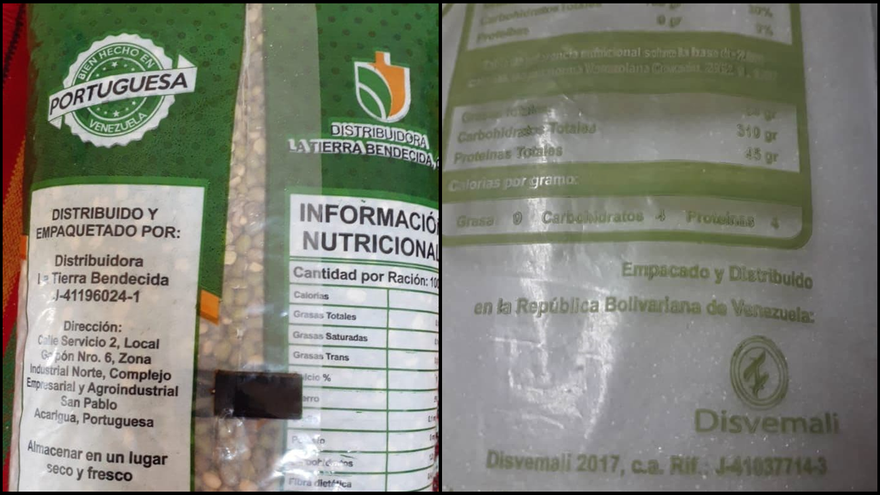
![]() 14ymedio, Havana, 10 August 2021 — The Government of Nicolás Maduro benefits Cuba, in addition to the oil sent, with shipments of mung beans, rice and soup; this is demonstrated by the Venezuelan products that are distributed in the basic ration basket on the island and that the official media reports are a part of the donation of 240 tons made by “friendly nations.”
14ymedio, Havana, 10 August 2021 — The Government of Nicolás Maduro benefits Cuba, in addition to the oil sent, with shipments of mung beans, rice and soup; this is demonstrated by the Venezuelan products that are distributed in the basic ration basket on the island and that the official media reports are a part of the donation of 240 tons made by “friendly nations.”
The mung beans that are being distributed are part of what Maduro acquires in Venezuela from local producers and are included in the boxes with products from the Local Supply and Production Committee (Clap), which began to be delivered to Venezuelans in 2016 and which have been questioned as a means of winning voters.
“The Clap box is prioritizing beans because they are the grains that are obtained here, since lentils come from cold and high climates and are mostly imported from Argentina and China,” said Ramón Elías Bolotín, director of Legumes and Oilseeds of the Confederation from Agricultural Producers of Venezuela (Fedeagro), speaking to Chronicle One.
But in Venezuela, mung beans are not abundant. The Venezuelan Society of Agricultural Engineers (Sviaa) recorded last year a production of 48.61% of the 72,000 hectares available for legumes, which would barely cover 12.95% of the needed supply.
Meanwhile, in Havana, two one-kilogram packages of mung beans are distributed as a part of the basic ration basket, packed by the La Dulce Carmelita company in Barquisimeto, in the Venezuelan state of Lara.
In Santiago de Cuba, as in the capital, there are two kilograms of the same grain, but these packages were prepared by the company La Tierra Bendecida, which is located in the Venezuelan state of Portuguesa. The consumption of mung beans is not common among Santiago residents, which has raised doubts about how to prepare them and what they taste like.
“They say it tastes very similar to lentil; many WhatsApp and Telegram groups are sending recipes to prepare them,” says a housewife. “You have to bring them to a boil and change the water twice and finally put them in the pressure cooker with the seasonings.”
In a country where beans are traditionally used to make stew, it is still a mystery how to process this grain. Right now, housewives are warning not to give them too much time on the stove because “they fall apart and do not taste like anything.” However, the precise recipe remains to be defined.
Mi Ángel is the Venezuelan brand of mung beans which the Cuban Government sent to Ciego de Ávila. The beans have been widely criticized in Venezuela for their poor quality. In 2020, a columnist for the newscast Aporrea claimed that this product became “pig food.”
“Having no other option to eat, we are forced to waste minutes and minutes separating a few grains from so much rubbish, dirt, insects … we have even been forced to wash them not only five or ten times, but up to twenty times and more,” Brígido Daniel Torrealba complained. “The irony is that front and center on the package, it says in large type: ’Selected grains’.”
Something similar happened to several people from Santiago who complained through the El Chago-Santiago de Cuba page about the poor quality of beans. In some shared photos “it is observed inside the packages and outside of them, what they identify as earth and a white fungus,” describes the publication.
Another looting, perhaps the main one, is the shipment of oil from Venezuela to Cuba, an “agreement” that is almost 22 years old and remains in force despite the economic crisis in which that South American country finds itself and the effects of the Covid-19 pandemic. In July alone, Venezuela sent a total of 713,097 barrels to the island.
The shipment of tankers with oil from Venezuela is consistent with the bilateral agreement since Hugo Chávez came to power in 1999. The supply of crude oil was given, first, in exchange for the provision of Cuban medical services, and was expanded to cover services in numerous sectors of the economy, such as mining, sports and electricity.
The benefits that Cuba receives from Venezuela have also been evidenced by the former Venezuelan ambassador to the United States, Carlos Vecchio, who denounced in 2020 the shipment of some 348 million dollars to Cuba in oil while 9.3 million Venezuelans live in severe and moderate food insecurity.
The diplomat said that the Nicolás Maduro regime sent 33 tanker ships to the island, loaded with just over 13 million barrels of “the best Venezuelan light crude, Merey.”
____________
COLLABORATE WITH OUR WORK: The 14ymedio team is committed to practicing serious journalism that reflects Cuba’s reality in all its depth. Thank you for joining us on this long journey. We invite you to continue supporting us by becoming a member of 14ymedio now. Together we can continue transforming journalism in Cuba.
